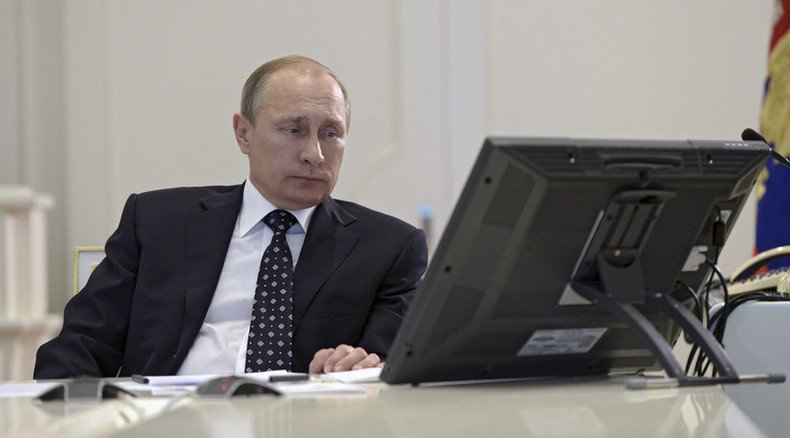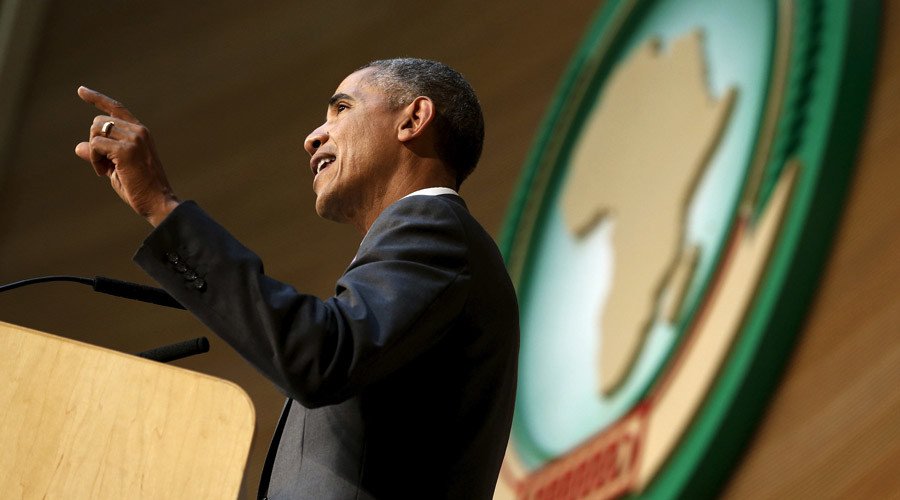US sanctions against Russia will have ‘deleterious effect on EU states’

Anti-Russian sanctions are not helping anybody, on the contrary they are reinforcing the growing rift between the US and the EU and this is going to have a profoundly negative effect both on the EU and the US in the near future, says Gregory Copley, editor at Defense and Foreign Affairs Journal.
The US has introduced further sanctions against Russia over events in East Ukraine and Crimea. The blacklist has been expanded to include new individuals and companies.
READ MORE: US imposes further sanctions on Russia over Crimea, east Ukraine conflict
RT: Mark Toner, State Department spokesperson, has said that these are not new sanctions, but strengthening of the existing sanctions. What do you make of that? Is that common practice?
Gregory Copley: Not really is it such common practice. They are using the existing legislation and practice to strengthen the sanctions regime. It’s no coincidence, however, as to the timing. The US worked very hard to get Russia aboard the P5+1 talks and an agreement with Iran. Now that that accord is in place with Iran, the US has begun to move to circumvent Iran and Iran’s allies. They have now moved to work with Turkey for example on getting Turkey back into the military operations against Syria, and to upgrade US operations against Syria. They are moving to, in other words, to constrain Iran by those actions and Iran’s allies and in this case it’s Russia.
So the US has introduced these sanctions or these additional sanctions literally as a follow-on to the post-Iran agreement, so they can now get back into the game of competing with Russia, competing with Iran. The State Department got what it wanted and President Obama got what he wanted by getting an agreement with Iran which is great for him domestically. But now he is moving back to support his old allies – Turkey, Saudi Arabia and the like – and to literally try and circumvent any Russian gains in the area.
RT: These new sanctions come on the heels of yesterday's UN vote on a tribunal for MH17. The American embassy in Russia says these issues are not linked. Then why did they mention it?
GC: I think the US expected Russia to veto that proposal so it was very much part of the process of renewed confrontation between Moscow and Washington or Washington and Moscow. Of course there is no suggestion that the US itself has to refrain from interference in Ukraine. The US has continued to escalate its provision of weapons to the western Ukraine government and has been providing a lot of agitation there leading up to the original Russian actions in Crimea for example.
RT: Have sanctions proved effective so far? Are they having a desired effect on Russia?
GC: There is no question that it’s not helping the Russian economy. The Western media is quick to point out that the Russian economy grew only by 1.5 percent until recently and a flat couple of quarters since then, so clearly something is happening. But the same could be said for the US economy which is flat negative at this stage. The reality is that the sanctions are not helping anybody, quite the contrary they are also reinforcing the growing rift between the US and the EU; this is going to have a profound effect negatively both on the EU and the US in the near future. We see that the US and some European states are trying to strengthen or reposition NATO once again to give it a mission, and Ukraine is part of the perceived threat which has done that. But the reality is that NATO is split, Europe and the US are split, and this is only going to get worse the more that the US uses sanctions against Russia, which will have a very deleterious effect particularly on the European states.

RT: US Marines have recently arrived in Ukraine for military drills. Is this going to create more tension?
GC: Of course it adds to tensions, it’s designed to do so. It’s designed to give President Obama the appearance that he is taking strong action and that he is a strong leader. In fact, the purpose and impact of these military deployments and the military aid to western Ukraine does not further US and Western strategic interests at this stage.
During the Cold War, the big goal was to drive a rift between the Soviet Union and the People’s Republic of China. That worked very successfully with Stalin and Nixon’s visit to China and the gradual rift which we saw between the PRC and the Soviet Union. What the current US actions have done in Ukraine has been effectively to drive the Russian Federation back into the arms of People’s Republic of China, creating a strategic block and the Shanghai Cooperation Organization (SCO), which is not necessarily helpful to the West at all.
Sanctions ‘astonishingly impotent’ as foreign policy tool
Patrick James, professor of International Relations at the University of Southern California, suggests that sanctions don’t work in terms of affecting policy changes, as those who suffer from them are basically ordinary people and not those in insular elite positions in society.
RT: The State Department says this is just a strengthening of the old sanctions, not the imposition of new ones. What's the difference?
Patrick James: The difference that anyone outside of an expert could detect would be very minimal. What they are saying in the papers, and of course it is being reported very differently in various places, is that it is a continuation of policy. They are claiming it’s not timed in any particular way as retaliation, but that isn’t taken very seriously. My own view is someone who has studied sanctions extensively and even published research on it is that they are generally a tempest in a teapot. The attempts to coerce against Russia will have absolutely no impact whatsoever.
READ MORE: West looks to close loopholes in anti-Russian sanctions – media
The reason it may be independently timed is that the President is not very well received right now across the board for the Iranian deal, and is in need for domestic political reasons for something that is a get-tough kind of movement. To be candid, since Russia is generally unpopular among Americans for the most part, it’s a convenient type of target. I don’t have any proof that what I’m saying is correct, but it would fit the bill, namely that the President is being accused perhaps of being too accommodating toward Iran, which is seen as a Russian client, and now can look, if you will, like he is a tough guy coming after the Russian sponsors of Iran with these new sanctions.
RT: The American embassy in Russia says the new restrictions are not linked to Wednesday's vote at the UN Security Council when Moscow vetoed the creation of an MH17 tribunal. Do you agree?
PJ: It’s so coincidental that occasionally these things can be that or, at the same time, it’s linked. Now if I had to bet everything that I had on which way it goes, it is not a coincidence and it is linked, but it also could be independently explained by domestic political problems and perhaps the president thought he could get a two-for-one; that is, he could retaliate for what happened quite recently in a Russian context, but also gets some mileage out of counteracting the weak- willed image that he is accused of having at this point on the international stage because of the accommodations toward Iran. In other words, it could really be both things at once and it’s hard to imagine there is no connection at all.
RT: Have sanctions proved effective so far?
PJ: Absolutely not. Sanctions - and much academic research on this subject bears out what I’m about to say - are astonishingly impotent. They do not have the impact that is intended a lot of the time regrettably those who suffer from sanctions are people in society in weak positions, they do not affect or change the view of people in insular elite positions in society, and therefore they tend to have no impact or, even worse, they actually damage survivability, quality of life whatever you want to call it, of people in vulnerable positions while getting absolutely no policy changes that are desired. I could cite many historical cases. Perhaps an interesting and amusing coincidence has been an attempt since approximately 1960s, soon after Fidel Castro had taken power, to engage in sanction of Cuba, which had absolutely no effect on Cuba whatsoever because it could find so many other places ultimately to sell its goods. First, the Soviet Union served as a protector; later on other states would be willing to trade with it. Sanctions don’t work in terms of affecting policy changes.
The statements, views and opinions expressed in this column are solely those of the author and do not necessarily represent those of RT.
LISTEN MORE:
The statements, views and opinions expressed in this column are solely those of the author and do not necessarily represent those of RT.












